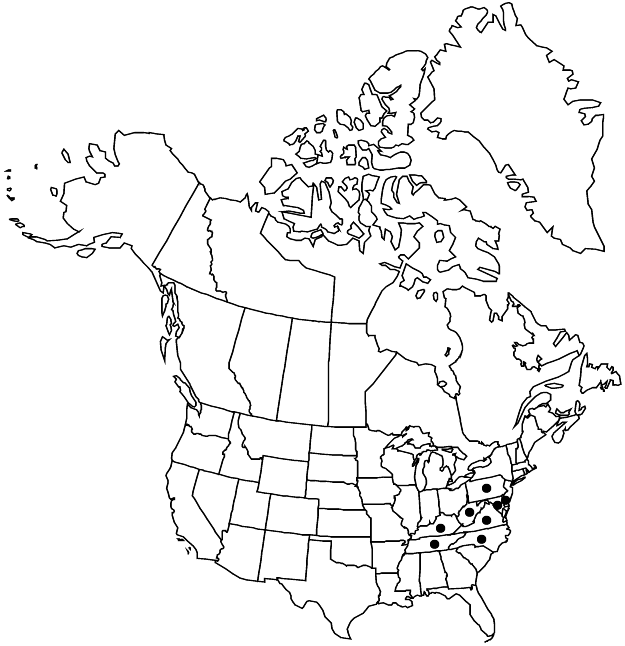Difference between revisions of "Gaylussacia brachycera"
Mem. Amer. Acad. Arts, n. s. 3: 54. 1846 ,.
FNA>Volume Importer |
imported>Volume Importer |
||
| (5 intermediate revisions by 2 users not shown) | |||
| Line 7: | Line 7: | ||
}} | }} | ||
|common_names=Box huckleberry | |common_names=Box huckleberry | ||
| − | |basionyms={{Treatment/ID/ | + | |special_status={{Treatment/ID/Special_status |
| + | |code=E | ||
| + | |label=Endemic | ||
| + | }} | ||
| + | |basionyms={{Treatment/ID/Basionym | ||
|name=Vaccinium brachycerum | |name=Vaccinium brachycerum | ||
|authority=Michaux | |authority=Michaux | ||
| + | |rank=species | ||
| + | |publication_title=Fl. Bor.-Amer. | ||
| + | |publication_place=1: 234. 1803 | ||
}} | }} | ||
|synonyms={{Treatment/ID/Synonym | |synonyms={{Treatment/ID/Synonym | ||
|name=Buxella brachycera | |name=Buxella brachycera | ||
|authority=(Michaux) Small | |authority=(Michaux) Small | ||
| + | |rank=species | ||
}} | }} | ||
|hierarchy=Ericaceae;Ericaceae subfam. Vaccinioideae;Gaylussacia;Gaylussacia brachycera | |hierarchy=Ericaceae;Ericaceae subfam. Vaccinioideae;Gaylussacia;Gaylussacia brachycera | ||
| Line 44: | Line 52: | ||
-->{{#Taxon: | -->{{#Taxon: | ||
name=Gaylussacia brachycera | name=Gaylussacia brachycera | ||
| − | |||
|authority=(Michaux) A. Gray | |authority=(Michaux) A. Gray | ||
|rank=species | |rank=species | ||
| Line 58: | Line 65: | ||
|publication title=Mem. Amer. Acad. Arts, n. s. | |publication title=Mem. Amer. Acad. Arts, n. s. | ||
|publication year= | |publication year= | ||
| − | |special status= | + | |special status=Endemic |
| − | |source xml=https:// | + | |source xml=https://bitbucket.org/aafc-mbb/fna-data-curation/src/2e0870ddd59836b60bcf96646a41e87ea5a5943a/coarse_grained_fna_xml/V8/V8_1036.xml |
|subfamily=Ericaceae subfam. Vaccinioideae | |subfamily=Ericaceae subfam. Vaccinioideae | ||
|genus=Gaylussacia | |genus=Gaylussacia | ||
Latest revision as of 22:41, 5 November 2020
Plants 2–4 dm, forming small to extensive colonies; branches spreading or procumbent; twigs of current season pale green to grayish brown, (strongly angled), puberulent. Leaves persistent; petiole 0.5–3 mm; blade pale green abaxially, shiny dark green adaxially, ovate, 1–2.5 × 0.5–1.3 cm, coriaceous, base rounded, margins crenate or serrulate, (revolute), apex obtuse, without resinous dots, surfaces glabrous adaxially, glabrous or puberulent along midvein and near blade base. Inflorescences spreading, 2–5-flowered, sometimes flowers solitary, ebracteate, 0.5–1 cm, puberulent. Pedicels 0.5–3 mm, glabrous; bracteoles (early deciduous), 1–3, (ovate), 2–4 mm, (margins ciliate). Flowers: sepals 4–5, 0.3–0.5 mm, glabrous; petals 4–5, corolla white to pink, campanulate-urceolate, 4 mm, lobes broadly deltate to rounded, 0.5–1.5 mm; filaments 1–1.5 mm, glabrous; anthers included, 1–1.5 mm, thecae not divergent distally; ovary glabrous. Drupes juicy, sweet, light blue, 6–8 mm diam., glabrous. Seeds 1–1.5 mm.
Phenology: Flowering late spring–early summer.
Habitat: Upland or montane woods
Elevation: (10-)200-1000 m
Distribution

Del., Ky., Md., N.C., Pa., Tenn., Va., W.Va.
Discussion
Gaylussacia brachycera is a dwarf evergreen shrub that forms large, solid-mat, self-sterile colonies, each one appearing to consist of a single clone that may extend over more than one hectare. One colony in Perry County, Pennsylvania, is about 1.5 kilometers wide; it appears to be a single clone that is over 12,000 years old and has been labeled as the oldest living thing in the world.